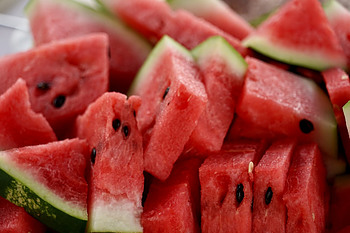Does Watermelon have Lycopene?

Watermelon is so tasty but does watermelon have lycopene? Read on to find out more about watermelon and lycopene.
Does Watermelon have Lycopene?

Yes, watermelon is a good source of lycopene. Lycopene is a naturally occurring pigment and antioxidant found in certain fruits and vegetables, giving them their vibrant red or pink color. Watermelon is known for its rich red color, which indicates the presence of lycopene.
Lycopene is a powerful antioxidant that has been associated with various health benefits, including:
- Heart health: Lycopene may help reduce the risk of heart disease by lowering blood pressure, improving blood vessel function, and reducing oxidative stress and inflammation.
- Cancer prevention: Some studies suggest that lycopene may have a protective effect against certain types of cancer, particularly prostate cancer. However, more research is needed to fully understand the extent of its benefits.
- Skin health: Lycopene is known to help protect the skin from UV damage, potentially reducing the risk of sunburn and skin aging caused by harmful sun exposure.
- Eye health: Lycopene is believed to have a positive impact on eye health by reducing the risk of age-related macular degeneration (AMD), which is a leading cause of vision loss in older adults.
It’s worth noting that lycopene is more readily absorbed by the body when consumed in cooked or processed forms, such as tomato sauce or tomato paste. However, watermelon is still a good source of dietary lycopene. The specific lycopene content of watermelon can vary based on factors like ripeness and variety, but it is generally considered a beneficial source of this antioxidant.
What are the 10 Health Benefits of Watermelon?
Watermelon offers various health benefits due to its nutrient content. Here are ten potential benefits of consuming watermelon:
- Hydration: Watermelon is high in water content, which helps keep you hydrated and supports proper bodily functions.
- Nutrient-rich: It is a good source of vitamins A and C, which act as antioxidants to protect your cells and boost immune function.
- Heart health: Watermelon contains citrulline, an amino acid that may help lower blood pressure and improve cardiovascular health.
- Eye health: The vitamin A and lycopene in watermelon contribute to maintaining healthy eyes and reducing the risk of age-related macular degeneration.
- Skin health: The high water content, vitamins, and antioxidants in watermelon can promote healthy skin and contribute to a youthful appearance.
- Digestive health: Watermelon contains dietary fiber, aiding in digestion, preventing constipation, and supporting a healthy digestive system.
- Anti-inflammatory properties: Some compounds found in watermelon, such as lycopene and cucurbitacin E, have anti-inflammatory effects that may help reduce inflammation in the body.
- Muscle soreness recovery: Watermelon’s citrulline content may help reduce muscle soreness and improve exercise recovery.
- Kidney health: The natural diuretic properties of watermelon can assist in promoting healthy kidney function and flushing out toxins.
- Weight management: Watermelon is low in calories and fat while providing a feeling of fullness due to its high water and fiber content, making it a satisfying snack choice for weight management.
It’s important to note that these benefits are based on general knowledge about watermelon, but individual experiences and health conditions may vary. It’s always advisable to consult with a healthcare professional or registered dietitian for personalized advice regarding your specific health needs.
Which has more lycopene tomatoes or watermelon?
Tomatoes generally have a higher lycopene content compared to watermelon. Lycopene is a red pigment and a potent antioxidant that belongs to the carotenoid family. It is responsible for the red color of certain fruits and vegetables.
While watermelon does contain lycopene, tomatoes are known to be one of the richest sources of this compound. The lycopene content in tomatoes increases as they ripen, with concentrated amounts found in cooked or processed tomato products such as tomato paste, sauce, and ketchup.
To give you a rough idea of the lycopene content, here are the approximate values for both tomatoes and watermelon:
- Tomatoes: On average, raw tomatoes contain about 3-4 mg of lycopene per 100 grams. However, the lycopene content can vary depending on the tomato variety and ripeness.
- Watermelon: Watermelon also contains lycopene, but in lower amounts compared to tomatoes. On average, ripe watermelon contains approximately 0.5-1 mg of lycopene per 100 grams.
So, if you’re specifically looking for a higher lycopene content, tomatoes would be the better choice. However, it’s worth noting that watermelon is still a nutritious fruit and provides other health benefits, such as being a good source of hydration and containing vitamins and minerals.






